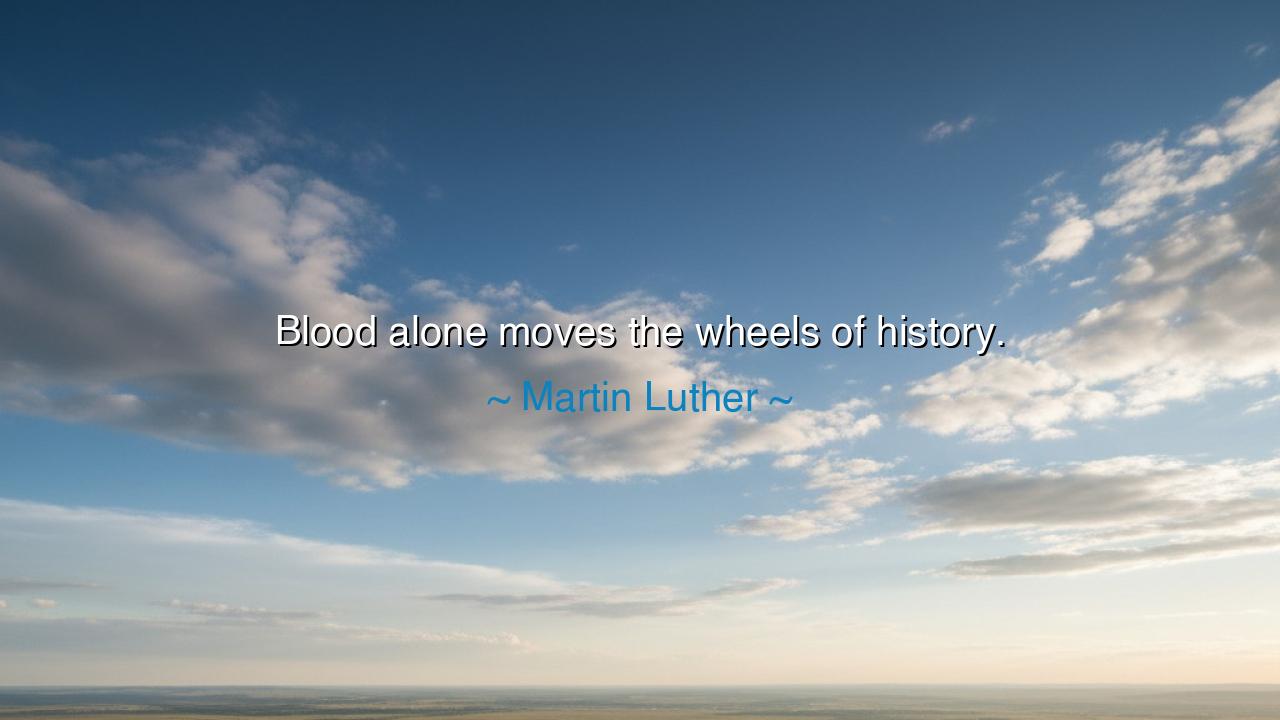
Blood alone moves the wheels of history.






The words of Martin Luther — “Blood alone moves the wheels of history.” — rise from an age of thunder and upheaval, an era when the soul of Europe trembled under the weight of transformation. These are not the words of a man delighting in violence, but of one who had gazed into the heart of humanity and seen the terrible price of change. In this single sentence, Luther captures a truth as ancient as civilization itself: that every great turning of the world, every rebirth of truth or freedom, is purchased through sacrifice, struggle, and often through blood.
To understand his words, one must remember the world from which they came. Martin Luther, the German monk who lit the fires of the Protestant Reformation, lived in a time when the Church held unchallenged dominion over men’s souls and kings ruled by divine decree. When he nailed his Ninety-Five Theses to the door of Wittenberg in 1517, he did not intend to start a revolution — yet the winds of heaven chose his act as the spark for one. His cry against corruption and tyranny shook the pillars of power, and with it came wars, persecutions, and rivers of blood. It was this bitter experience that taught him the meaning behind his own words: that history does not move by peace alone, but by the courage — and suffering — of those who dare to challenge the unmovable.
The blood that moves history is not always that of warriors; it is also the blood of martyrs, reformers, and the innocent caught in the storm of change. Every new dawn has been preceded by a long night of struggle. When the Israelites fled Egypt, they crossed a sea that closed over their oppressors. When freedom came to Rome, it was borne on the swords of slaves led by Spartacus. When nations rose from the ashes of tyranny, they were watered by the sacrifices of those who refused to kneel. Thus, Luther’s words are both a lament and a declaration — that progress and peace are forged not in comfort, but in conflict and conviction.
Consider the story of Abraham Lincoln, centuries later, facing a nation torn by slavery. He, too, believed in a moral reformation — that no man should own another — but he learned, as Luther had, that righteousness alone does not move nations. It was the terrible Civil War, and the countless who perished upon its battlefields, that broke the chains of bondage. The wheels of history turned once more, greased with the blood of the just and the unjust alike. Yet from that crimson soil grew a new birth of freedom. Luther’s truth echoed across time: the cost of moral progress is always written in human sacrifice.
But let none mistake his words as a call to violence. The “blood” of which Luther speaks is also the blood of endurance — the lifeblood of conviction, the pain of those who refuse to yield when truth is on trial. To stand for justice, to speak against falsehood, to demand reform in the face of power — these, too, are acts of blood, though no sword is drawn. The courage to suffer for what is right is the deepest form of heroism. The wheels of history are turned as much by the suffering of the righteous as by the battles of the strong.
There is also a warning in his words. For if blood moves history, then every drop spilled unjustly demands remembrance. The same fires that purify can also destroy. The wise must seek to learn from the pain of the past, that progress might not always require the same cruel cost. Each generation must ask: can we move the wheels of history with wisdom, with courage, with compassion — before they must again be turned by blood?
The lesson of Luther’s words, then, is this: greatness is never born without cost. Whether in the transformation of nations or the growth of a single soul, progress demands the willingness to endure suffering, to confront danger, to shed — metaphorically or literally — the lifeblood of comfort and safety. History does not remember the passive, but the passionate; not those who avoided conflict, but those who faced it with honor.
So, my listener, when you seek to change your world — whether in your home, your nation, or your heart — remember these words. Do not fear the struggle that comes with truth. Know that every age of peace has been bought by an age of pain, and that your courage, your sacrifice, your steadfastness in the face of opposition, may yet turn the wheel once more. For as Luther saw clearly: it is not time, nor words, nor gold that moves history — it is blood, and the spirit that dares to bleed for what is right.






AAdministratorAdministrator
Welcome, honored guests. Please leave a comment, we will respond soon